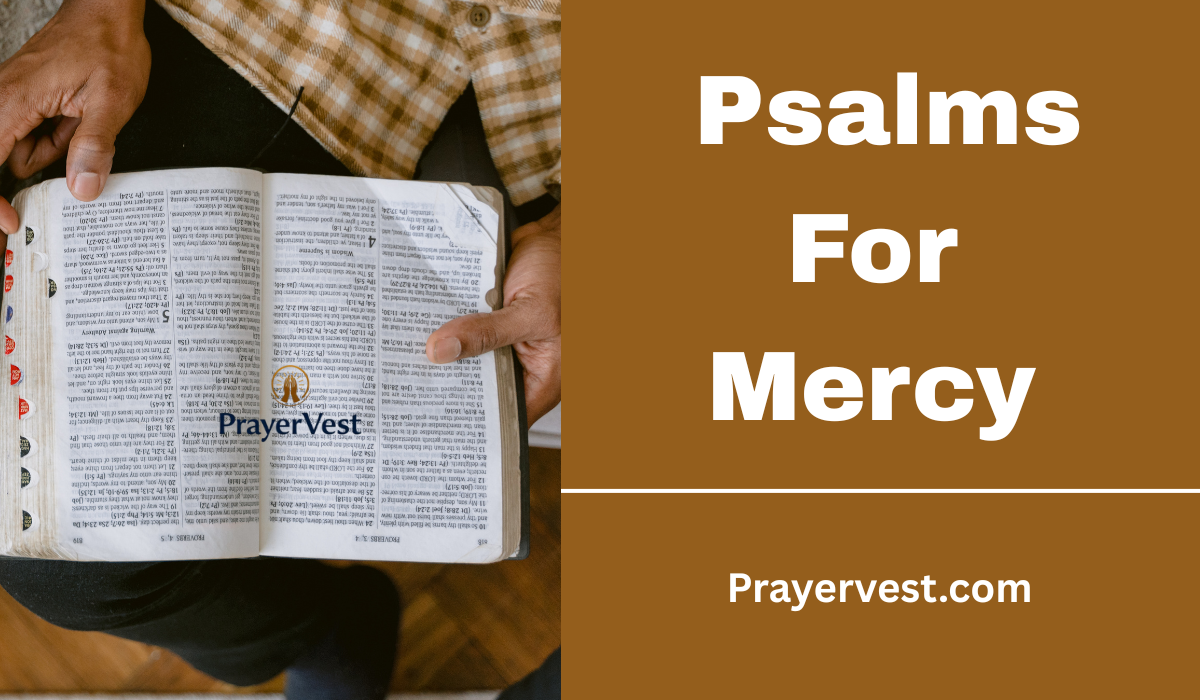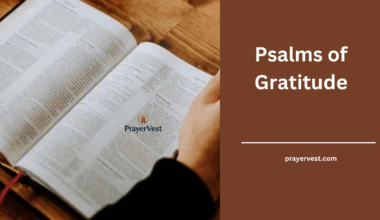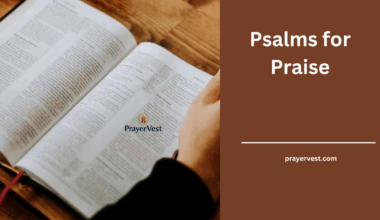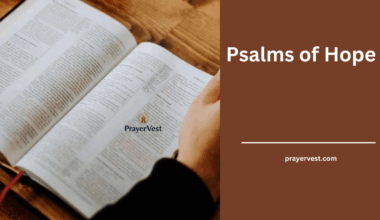Every soul that has experienced failure, weakness, or suffering can relate to the genuine petitions for compassion found throughout the book of Psalms. Mercy is a holy God’s loving reaction to human brokenness; it goes beyond simple forgiveness.
The psalms for mercy provide us with words to approach God with humility and hope when we are feeling inadequate, embarrassed, or overpowered by life’s hardships. These age-old prayers serve as a reminder that we worship a righteous and merciful God who is willing to pardon, heal, and rejuvenate.
The Psalms contain instances of both asking for and offering mercy. Being a man after God’s image, David frequently begged for forgiveness, not out of entitlement but out of humility and contrition.
The weight of grief and the anguish of guilt are not concealed in these psalms; rather, they are freely presented to God. We witness the outpouring of heavenly mercy in return, with lives restored, crimes pardoned, and hearts mended. These verses tell us that God, who takes great pleasure in expressing love to the repentant and lowly, bestows mercy via faith rather than something that must be earned.


We find solace and a sense of connection with God’s heart when we dwell on psalms that beg for mercy. They instruct us on how to react when we experience injustice, spiritual need, or personal failure. The Psalms remind you that God’s mercy is always there, whether you’re wishing for a second opportunity, finding it difficult to forgive yourself, or just needing God’s tender touch. These verses provide a way to enter God’s presence, where hope is restored and grace is freely given.
50 Most Effective Psalms For Mercy (2026)
1. Psalm 6:2
“Have mercy on me, Lord, for I am faint; heal me, Lord, for my bones are in agony.”
David pleads with God in raw vulnerability, asking for mercy amid deep physical and emotional distress. This verse captures the sincerity of someone who recognizes his fragility and turns to God for healing. Mercy here is not merely a pardon for sin but a compassionate response to human weakness. David knows that healing flows from God’s tender compassion, not human strength. It is a call that acknowledges our total dependence on God’s gracious touch when life becomes too heavy to bear.
Reflection
In moments when our pain feels overwhelming, God invites us to call on Him for mercy. This Psalm permits us to bring our fatigue, sorrow, and brokenness to the Lord. His mercy is not only for the guilty but also for the weary. It’s a reminder that God sees our suffering and does not turn away from our need. When we come to Him honestly—bones aching, soul faint—He meets us with healing, not condemnation. His mercy restores what pain and fear try to destroy.
2. Psalm 25:6-7
“Remember, Lord, your great mercy and love, for they are from of old. Do not remember the sins of my youth and my rebellious ways.”
David appeals to God’s eternal character, not his record. He trusts that God’s mercy has always been part of His nature, from the beginning of time. By asking God to forget his past sins while remembering His mercy, David draws a powerful contrast. This Psalm reminds us that God’s mercy is not earned—it is intrinsic to who He is. Even the sins we regret the most are not stronger than His faithful compassion.
Reflection
We often carry shame from our past, believing that our youthful rebellion disqualifies us from God’s love. But David’s prayer shifts our focus from guilt to grace. He doesn’t plead based on improved behavior, but on the unchanging mercy of God. When we feel the weight of our past, we must remind ourselves that God remembers His mercy more than our mistakes. That is the essence of grace—God chooses compassion over condemnation.
3. Psalm 30:10
“Hear, Lord, and be merciful to me; Lord, be my help.”
In this brief but heartfelt cry, David calls on God for help, grounded in mercy. It’s a reminder that divine aid is not something we can demand, but something we receive when we appeal to God’s nature. This verse shows how intimately connected mercy is with God’s willingness to help His people. Mercy is not just forgiveness—it’s God stepping in when we are weak and desperate.
Reflection
When words fail and strength fades, we can still pray this simple plea: “Be merciful to me.” God doesn’t require eloquence or perfection—just a sincere heart turned toward Him. Mercy means that even when we can’t fix our situation, God chooses to intervene because of His love. Whether we are hurting, confused, or lost, His mercy meets us right where we are and lifts us.
4. Psalm 51:1
“Have mercy on me, O God, according to your unfailing love; according to your great compassion blot out my transgressions.”
This verse opens David’s famous prayer of repentance after his grievous sin with Bathsheba. It is not just an apology—it is a cry to the very heart of God’s nature. David appeals not to God’s justice but to His love and compassion. Mercy, in this context, is God choosing to forgive when justice could have condemned. David knows that only mercy can cleanse his soul and restore his relationship with God.
Reflection
We all come to moments where we recognize how deeply we’ve failed. But this verse shows us that repentance isn’t about groveling—it’s about returning to the God of mercy. David’s example reminds us that no sin is too great for God’s love. When we confess honestly and throw ourselves on His mercy, He meets us not with rejection, but with forgiveness and grace. God’s mercy can reach the darkest corners of our hearts and wash them clean.
5. Psalm 86:3
“Have mercy on me, Lord, for I call to you all day long.”
This verse reflects the persistence of someone in desperate need of God’s mercy. David doesn’t just make a one-time request—he continually lifts his voice to God. His endurance in prayer shows a heart that trusts in God’s responsiveness. It reminds us that mercy is not something we beg for in vain; it’s something God gives to those who seek Him with humility and hope.
Reflection
In seasons where suffering stretches across days or even years, our prayers for mercy may feel repetitive. But David reminds us that perseverance in prayer is not futile. God does not grow weary of our cries—He listens, even when we feel unheard. His mercy is not rationed. Each time we call, we are met by a compassionate Father who welcomes our voices and holds our hearts with gentleness.
6. Psalm 103:8
“The Lord is compassionate and gracious, slow to anger, abounding in love.”
This verse offers a powerful portrait of God’s character. Mercy flows from who He is, not from how deserving we are. God does not act impulsively or harshly; instead, He responds with patience and overwhelming love. This verse forms the foundation for trust in God’s mercy—it is not temporary or inconsistent, but vast and enduring.
Reflection
When we struggle to believe that God will forgive us again, Psalm 103:8 assures us that mercy isn’t something He runs out of. His grace is not reluctant; it overflows. God does not get tired of us coming back. His love is not limited by our repeated failures. It is precisely in our moments of messiness and imperfection that His mercy proves most amazing.
7. Psalm 41:4
“I said, ‘Have mercy on me, Lord; heal me, for I have sinned against you.’”
David connects the need for healing with the need for mercy. Sin has affected both his spiritual and physical well-being, and he seeks restoration on both fronts. This verse teaches us that mercy is comprehensive—it covers our guilt and restores our wholeness. God’s mercy does not stop at forgiveness; it brings healing too.
Reflection
Our sin may break us, but it does not break God’s desire to restore us. When we cry out for mercy, we are also asking for healing from shame, regret, and the damage caused by our actions. David reminds us that even in our guilt, we can approach God. He is not only willing to forgive but eager to make us whole again.
8. Psalm 130:3-4
“If you, Lord, kept a record of sins, Lord, who could stand? But with you there is forgiveness, so that we can, with reverence, serve you.”
This verse acknowledges the impossibility of human righteousness apart from God’s mercy. None of us could stand blameless if God judged us strictly. Yet, He offers forgiveness so that we can live in a reverent relationship with Him. Mercy transforms fear into worship and guilt into service.
Reflection
The weight of our sin can paralyze us, but this Psalm shifts our focus. God’s mercy doesn’t merely wipe the slate clean—it draws us closer to Him. Instead of running from God in fear, we are invited to serve Him with reverence because of His forgiveness. Mercy is not just about relief; it’s about restoration and renewed purpose.
9. Psalm 123:3
“Have mercy on us, Lord, have mercy on us, for we have endured no end of contempt.”
Here, the Psalmist cries out on behalf of the community, burdened by mockery and scorn. Mercy is sought not just for individual wrongdoing but for communal suffering. This verse shows that mercy extends to those who are oppressed, ridiculed, or belittled. It is God’s compassionate response to injustice.
Reflection
When we face rejection, bullying, or persecution, our souls cry out for mercy. God’s mercy meets us not only when we sin but when we suffer. He sees the injustice we endure and hears our prayers for relief. His mercy doesn’t ignore our wounds—it lifts us out of contempt and into dignity as His beloved.
10. Psalm 57:1
“Have mercy on me, my God, have mercy on me, for in you I take refuge. I will take refuge in the shadow of your wings until the disaster has passed.”
David speaks from a place of hiding, seeking refuge in God’s mercy during a time of danger. He compares God’s protection to the shadow of wings—an image of shelter, safety, and closeness. Mercy here is not just forgiveness; it’s God’s compassionate shield in times of trouble.
Reflection
In life’s storms, we often search for a safe place. This verse shows us that mercy is not just something God gives—it’s a place we can dwell in. Under His wings, we find safety from the chaos around us. His mercy doesn’t always remove the disaster immediately, but it gives us shelter and peace while we wait for it to pass.
11. Psalm 6:2
“Have mercy on me, Lord, for I am faint; heal me, Lord, for my bones are in agony.”
David’s cry in this verse reveals the depth of his physical and emotional distress. He turns to God not just with words, but with desperation. His pain is real, and his plea for mercy is raw and unfiltered. This verse highlights that God invites us to come as we are—wounded, weak, and weary—to receive healing through His compassion.
Reflection
When our bodies ache and our spirits grow faint, we can turn to the same God David did. He does not turn away from weakness. Instead, He steps into our pain with mercy that heals, comforts, and renews. In moments when we feel too fragile to pray, a simple plea—“Have mercy on me, Lord”—carries all the power of faith.
12. Psalm 25:6
“Remember, Lord, your great mercy and love, for they are from of old.”
David appeals to God’s long-standing character. He doesn’t ask for mercy because he deserves it; he asks because mercy is who God has always been. This verse reminds us that God’s mercy isn’t a new invention—it is eternal and deeply rooted in His identity.
Reflection
When we fear we’ve gone too far or failed too deeply, we can anchor ourselves in the unchanging nature of God’s mercy. His love didn’t start yesterday, and it won’t run dry tomorrow. We are held by a mercy that spans generations and never forgets the promises of grace.
13. Psalm 9:13
“Lord, see how my enemies persecute me! Have mercy and lift me up from the gates of death.”
In this verse, David pleads for mercy amid violent opposition. His life is in danger, yet his hope lies in God’s ability to intervene and rescue. This verse reflects the trust that God’s mercy includes protection and deliverance when we are under attack.
Reflection
Life can push us to the brink, surrounded by threats—physical, emotional, or spiritual. But even from the edge of despair, we can cry for mercy. God not only hears, but He rescues. His mercy can lift us from the lowest places and set our feet on solid ground once more.
14. Psalm 51:1
“Have mercy on me, O God, according to your unfailing love; according to your great compassion blot out my transgressions.”
David’s most famous prayer of repentance begins with a plea for mercy. He doesn’t appeal to his deeds or past faithfulness but to God’s unfailing love. This verse shows us that mercy flows from divine compassion, not human merit.
Reflection
When we are weighed down by guilt, Psalm 51 offers the path forward: come as you are, not pretending, not performing—just pleading for mercy. And the incredible truth is that God responds not with wrath, but with cleansing love. His mercy is greater than your worst mistake.
15. Psalm 102:13
“You will arise and have compassion on Zion, for it is time to show favor to her; the appointed time has come.”
This verse speaks to God’s timing in showing mercy and favor. Even when it feels delayed, His compassion always arrives at the appointed time. It reminds us that God’s mercy is not random—it’s perfectly timed, orchestrated by divine wisdom.
Reflection
Waiting for mercy can feel like silence, but God is never late. His compassion doesn’t forget us. It arrives with purpose, in the exact moment when it will bring the most healing and glory. Keep hoping, even in the delay—His mercy will come.
16. Psalm 30:10
“Hear, Lord, and be merciful to me; Lord, be my help.”
In the simplicity of this verse, David voices a deep and urgent need. His call for mercy isn’t complicated—it’s direct and heartfelt. He knows that mercy and help are inseparable, and both come from God.
Reflection
Sometimes all we can manage is a whisper: “Lord, be my help.” And that’s enough. God hears and responds to even the shortest prayers when they come from the heart. His mercy doesn’t require eloquence—it only requires honesty and faith.
17. Psalm 145:9
“The Lord is good to all; he has compassion on all he has made.”
This verse celebrates the universal scope of God’s mercy. His goodness is not limited to a select few; His compassion extends to all creation. It speaks to a God who sees every creature and responds with kindness.
Reflection
If you’ve ever wondered whether God sees you, this verse answers with a resounding yes. You are not invisible. His mercy is not for the “worthy”; it is for the weary, the broken, the forgotten—and that includes you. His goodness knows no boundary.
18. Psalm 77:9
“Has God forgotten to be merciful? Has he in anger withheld his compassion?”
This verse captures a moment of deep doubt and emotional anguish. The psalmist wonders if God’s mercy has run out. Yet this raw honesty opens the door to rediscovering God’s unchanging faithfulness.
Reflection
Doubt does not disqualify you from mercy. When you question, cry, or wonder where God is, He doesn’t withdraw—He draws near. The very act of asking these hard questions is a form of seeking Him. And He will answer, not with anger, but with mercy.
19. Psalm 136:1
“Give thanks to the Lord, for he is good. His love endures forever.”
Repeated throughout Psalm 136, this refrain anchors every act of God in enduring love. His mercy is not momentary or occasional—it is everlasting. Gratitude flows naturally when we recognize this truth.
Reflection
God’s mercy is not an event—it’s a reality. Every sunrise, every breath, every second of grace flows from His enduring love. Thankfulness doesn’t require perfection in our lives; it just requires awareness of His mercy.
20. Psalm 25:10
“All the ways of the Lord are loving and faithful toward those who keep the demands of his covenant.”
This verse highlights the consistency of God’s mercy for those who walk with Him. His path is marked by love and faithfulness. Mercy is not just what He gives—it’s how He leads.
Reflection
When life feels unpredictable, God’s ways remain steady. His mercy isn’t a surprise twist—it’s the path beneath our feet when we walk with Him. Even when we stray, His love draws us back into His faithful embrace.
21. Psalm 31:9
“Be merciful to me, Lord, for I am in distress; my eyes grow weak with sorrow, my soul and body with grief.”
This verse presents a cry from the depths of emotional and physical exhaustion. David is overwhelmed by sorrow and pleads for God’s mercy as his only source of comfort. It reminds us that God’s mercy isn’t just for sin but also for the sorrow we carry.
Reflection
Grief can be a heavy burden that clouds the eyes and weakens the spirit. But when we call on God’s mercy, we invite Him into our pain. He doesn’t ask us to hide our emotions—He meets us in them, offering comfort that heals the soul and revives the heart.
22. Psalm 33:18
“But the eyes of the Lord are on those who fear him, on those whose hope is in his unfailing love.”
This verse reassures us that God is watching over those who revere Him and place their hope in His steadfast love. Mercy is not random; it’s God’s intentional attention toward those who trust in Him.
Reflection
You are never out of God’s sight. Even when your heart feels far, His eyes are on you, full of mercy and ready to act in love. Hope in His mercy is never wasted. He sees, He knows, and He responds with compassion at the perfect time.
23. Psalm 40:11
“Do not withhold your mercy from me, Lord; may your love and faithfulness always protect me.”
David acknowledges his complete dependence on God’s mercy for ongoing protection. He doesn’t assume he’s earned it—he simply asks God to continue the flow of His faithful love.
Reflection
We all need constant mercy, not just once, but daily. This verse teaches us to live in continual dependence on God, trusting not in our righteousness but in His. His mercy is not a one-time rescue; it’s a daily covering that shields and sustains us.
24. Psalm 41:4
“I said, ‘Have mercy on me, Lord; heal me, for I have sinned against you.’”
Here, David connects the need for mercy with both physical and spiritual healing. He confesses his sin while also acknowledging his frailty, showing us that mercy addresses the whole person—body, soul, and spirit.
Reflection
True healing comes when we bring our entire selves—our sin, sickness, and sorrow—into the light of God’s mercy. He doesn’t divide our need into categories; He meets every part of us with holistic grace and healing power.
25. Psalm 57:1
“Have mercy on me, my God, have mercy on me, for in you I take refuge. I will take refuge in the shadow of your wings until the disaster has passed.”
This psalm was written by David while hiding in a cave from his enemies. His plea for mercy is intertwined with his trust in God’s protection. He sees God as a haven in the storm.
Reflection
When danger surrounds you, God invites you to rest in the shelter of His mercy. Like a bird covers its young, God covers His people. Mercy is not just forgiveness; it’s protection. In His presence, we are safe—even in the middle of life’s fiercest battles.
26. Psalm 67:1
“May God be gracious to us and bless us and make his face shine on us.”
This beautiful verse is a blessing that acknowledges the need for God’s grace and presence. To have His face shine on us is to live under His favor and mercy.
Reflection
We thrive under the warmth of God’s mercy. His grace isn’t just for desperate moments—it’s the daily light that helps us grow. When God shines His face on us, we flourish. Ask for His mercy today—not out of fear, but because His love is life-giving.
27. Psalm 69:16
“Answer me, Lord, out of the goodness of your love; in your great mercy turn to me.”
David pleads for God to respond not because of his own worthiness, but based on God’s own loving nature. This verse teaches us to appeal to God’s character, not our condition.
Reflection
Sometimes the only prayer we can offer is, “Turn to me.” And that’s enough. God’s mercy is not distant or indifferent. It moves toward us, led by love. You don’t have to convince God to care—He already does.
28. Psalm 86:15
“But you, Lord, are a compassionate and gracious God, slow to anger, abounding in love and faithfulness.”
This verse is a powerful declaration of God’s nature, repeated throughout Scripture. It underscores that God’s mercy is not limited by our failings—it is abundant and patient.
Reflection
God’s mercy is not fragile. It doesn’t shatter when we fall. He is slow to anger and rich in love. This truth invites us to stop running and start returning. Mercy meets us not with condemnation, but with arms wide open.
29. Psalm 103:10
“He does not treat us as our sins deserve or repay us according to our iniquities.”
This verse captures the essence of mercy: undeserved kindness. God withholds the punishment we deserve and instead offers grace and forgiveness.
Reflection
You don’t have to live in fear of payback. God is not keeping a scorecard. His mercy wipes the slate clean, again and again. Trust in the One who chooses compassion over condemnation every time you turn to Him.
30. Psalm 116:5
“The Lord is gracious and righteous; our God is full of compassion.”
This verse declares that God’s justice and compassion are not in conflict. He is righteous, yet deeply merciful. This balance defines His dealings with His people.
Reflection
God’s mercy is not weakness—it is powerful love expressed through righteousness. When we come to Him, we are not met with cold justice, but with grace that transforms. His compassion is steady, trustworthy, and always available to those who call on Him.
31. Psalm 119:132
“Turn to me and have mercy on me, as you always do to those who love your name.”
This verse is a heartfelt plea for personal attention from God. It highlights God’s consistent mercy toward those who love Him. The psalmist appeals not just for a one-time act but for the continuation of a divine pattern.
Reflection
God’s mercy isn’t sporadic—it’s dependable. Just as the psalmist anchors his hope in God’s past actions, so can we. He has been merciful before, and He will be again. When we love His name, we can confidently approach Him, knowing mercy flows from who He is.
32. Psalm 130:7
“Israel, put your hope in the Lord, for with the Lord is unfailing love and with him is full redemption.”
This verse calls the people of God to place their hope not in circumstances, but in the Lord’s unfailing love and His ability to redeem completely. Mercy and redemption go hand in hand.
Reflection
No matter how deep the pit, God’s mercy reaches deeper. Full redemption isn’t partial rescue—it’s complete restoration. When you put your hope in the Lord, you’re trusting in a love that never fails and a mercy that never quits.
33. Psalm 123:2
“As the eyes of slaves look to the hand of their master… so our eyes look to the Lord our God, till he shows us his mercy.”
This verse uses imagery of dependence to express longing for God’s mercy. The psalmist watches for divine kindness with the same intensity that a servant waits for provision or instruction.
Reflection
Mercy is not earned—it’s awaited. Like servants watching intently, we look to God not with entitlement, but with expectation. Waiting on God is not passive; it’s full of faith that His mercy will come exactly when we need it.
34. Psalm 136:1
“Give thanks to the Lord, for he is good. His love endures forever.”
This verse opens a psalm where every line repeats the phrase “His love endures forever,” emphasizing God’s eternal mercy. It teaches us to thank God, not only for what He does but for who He is.
Reflection
Gratitude is the natural response to mercy. God’s goodness doesn’t expire; His mercy doesn’t run dry. No matter what you face today, you can give thanks—because the God who loves you never changes, and His mercy never ends.
35. Psalm 6:2
“Have mercy on me, Lord, for I am faint; heal me, Lord, for my bones are in agony.”
This verse connects physical weakness with the need for God’s mercy. David cries out not only in spiritual desperation but in bodily pain, recognizing that healing begins with the mercy of God.
Reflection
Even in our most fragile moments, God hears us. His mercy reaches beyond the soul to touch the body. Whether it’s sickness, exhaustion, or despair, our cries are met with the healing hand of divine compassion.
36. Psalm 9:13
“Lord, see how my enemies persecute me! Have mercy and lift me up from the gates of death.”
This verse is a cry for deliverance from danger and destruction. David appeals to God’s mercy not only for rescue but for revival—from near death to life again.
Reflection
Mercy isn’t just about forgiveness—it’s about resurrection. When enemies surround you or despair closes in, God’s mercy has the power to lift you from the brink. He doesn’t just save you from something; He raises you into something greater.
37. Psalm 25:10
“All the ways of the Lord are loving and faithful toward those who keep the demands of his covenant.”
This verse highlights God’s consistent character. His mercy is not occasional or conditional—it’s woven into His very ways and is always accompanied by faithfulness.
Reflection
You don’t have to wonder what kind of mood God is in today. All His ways are mercy and truth. When you walk with Him, you walk in the assurance that His heart is always turned toward you in love and loyalty.
38. Psalm 143:1
“Lord, hear my prayer, listen to my cry for mercy; in your faithfulness and righteousness come to my relief.”
David calls on God not based on personal merit but on divine faithfulness. Mercy is not demanded—it is humbly requested, grounded in the assurance of God’s trustworthiness.
Reflection
Sometimes, all we can do is cry out. And that’s enough. Mercy answers desperation with faithfulness. You don’t have to prove your worth—just lift your voice, and the God of compassion will come to your aid.
39. Psalm 69:13
“But I pray to you, Lord, in the time of your favor; in your great love, O God, answer me with your sure salvation.”
David expresses confidence that God hears in “the time of His favor,” showing us that prayer for mercy should be rooted in divine timing and love.
Reflection
Mercy doesn’t always come on our schedule, but it always arrives on time. Trust in God’s timing means trusting that His love never fails. When you pray in faith, His favor will meet you in ways beyond what you imagined.
40. Psalm 119:76
“May your unfailing love be my comfort, according to your promise to your servant.”
This verse links comfort with the promise of God’s love. It reminds us that mercy often looks like divine reassurance—God drawing near in our pain and fulfilling His Word.
Reflection
Sometimes the greatest gift of mercy is comfort. Not the removal of problems, but the presence of peace. God’s Word is full of promises, and each one is soaked in His mercy. Let His unfailing love be your anchor when everything else is shaking.
41. Psalm 41:4
“I said, ‘Have mercy on me, Lord; heal me, for I have sinned against you.’”
This verse is a transparent confession, linking sin to suffering. David acknowledges both his wrongdoing and his need for mercy and healing from God. Mercy is sought not just for pardon but for restoration.
Reflection
True healing begins with honest repentance. Mercy isn’t just about overlooking faults—it’s about mending what’s broken. When you bring your failures before God, you’re not met with condemnation but with a healing embrace. His mercy restores what sin has wounded.
42. Psalm 67:1
“May God be gracious to us and bless us and make his face shine on us—”
This verse is both a blessing and a prayer for mercy. God’s graciousness is pictured as His radiant face turning toward us in favor. Mercy here is the foundation of every other blessing.
Reflection
When God turns His face toward us, everything changes. His mercy brings clarity, favor, and joy. Ask boldly for His face to shine on you—not because you deserve it, but because He delights in showing mercy to those who seek Him.
43. Psalm 103:10
“He does not treat us as our sins deserve or repay us according to our iniquities.”
This verse is one of the clearest expressions of God’s mercy in Scripture. It reminds us that we are not given what we’ve earned, but instead, we are given grace.
Reflection
Mercy withholds what justice would demand. God sees your sin clearly, yet chooses to respond with compassion. That is the heart of the gospel—that we are not repaid according to our iniquities, but invited into grace, forgiveness, and new life.
44. Psalm 103:13
“As a father has compassion on his children, so the Lord has compassion on those who fear him.”
God’s mercy is likened to the compassion of a loving father. This familial image reminds us that divine mercy is relational, tender, and deeply personal.
Reflection
When you think of God’s mercy, think of a father embracing his child. He is not distant or disinterested—He draws close. In your weaknesses, stumbles, and fears, His compassion covers you like a warm blanket of grace.
45. Psalm 145:8
“The Lord is gracious and compassionate, slow to anger and rich in love.”
This verse describes God’s character with a string of powerful attributes—grace, compassion, patience, and steadfast love. These form the foundation of His mercy.
Reflection
God is not quick to anger or eager to punish. He is overflowing with mercy, rich in love, and endlessly patient. When you come to Him, you don’t find wrath—you find a gracious Father waiting to hold you close and lift you up.
46. Psalm 32:10
“Many are the woes of the wicked, but the Lord’s unfailing love surrounds the one who trusts in him.”
Here, mercy is described as a protective shield. Those who trust in God are surrounded—completely encompassed—by His steadfast love.
Reflection
Trust activates the shelter of mercy. When you lean into God rather than run from Him, His love wraps around you like armor. In life’s battles, God’s mercy isn’t just an idea—it’s your defense, your peace, and your safe place.
47. Psalm 69:16
“Answer me, Lord, out of the goodness of your love; in your great mercy turn to me.”
David cries out to be heard, not based on his righteousness but on God’s goodness and mercy. It’s a model of how to pray: appealing to who God is, not what we’ve done.
Reflection
You don’t have to persuade God to love you—He already does. When you pray, lean on His nature, not your merit. His mercy flows from His goodness, and when you call, He will turn to you with kindness and power.
48. Psalm 106:1
“Praise the Lord. Give thanks to the Lord, for he is good; his love endures forever.”
This verse celebrates God’s eternal mercy as a reason for thanksgiving and praise. Gratitude and mercy are deeply intertwined.
Reflection
The more we understand mercy, the more thankful we become. God’s love doesn’t expire—it endures forever. And because of that, we can live each day with a heart full of praise, even in our brokenness.
49. Psalm 107:1
“Give thanks to the Lord, for he is good; his love endures forever.”
Almost identical to Psalm 106:1, this verse emphasizes enduring mercy again, reinforcing its centrality in the life of faith. Repetition in Scripture highlights importance.
Reflection
When something’s repeated in God’s Word, we should pay attention. Mercy is not a footnote—it’s the headline of who God is. Let this truth soak into your soul: His love endures forever. That’s the ground you stand on.
50. Psalm 25:7
“Do not remember the sins of my youth and my rebellious ways; according to your love remember me, for you, Lord, are good.”
David appeals to God’s love to overlook his past failures. He asks to be remembered by God not in light of his sin, but in light of divine goodness.
Reflection
We all have a past we wish God would forget. And the beauty of mercy is—He does. He chooses to see us through the lens of His love, not our rebellion. That is the power of grace: God remembers us, not for our failures, but for His faithfulness.
Conclusion
The Psalms remind us that we can always turn to God for mercy when we are feeling guilty, grieving, or in dire need. The screams of humanity—imperfect, frail, and in need of grace—are echoed by these holy melodies. They also show the heart of a loving God who seeks out those who seek Him in humility and does not turn away from the broken. These passages reassure us that divine mercy is a forceful and present reality rather than a far-off aspiration, whether it is David begging for pardon or a psalmist overcome by pain.
As you consider these Psalms, allow them to direct your prayers, mold your perception of God’s nature, and strengthen your faith in His goodness. The remorseful are the ones who deserve mercy, not the flawless. Those who ask are showered with it. Today, God’s kindness is available, renewing, and unfailing, regardless of where you are—in regret, adversity, or quiet need. As you get closer to the One who takes pleasure in extending mercy, let these words become your own.






